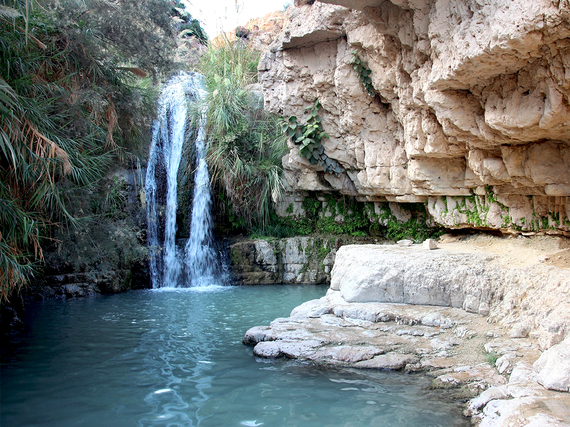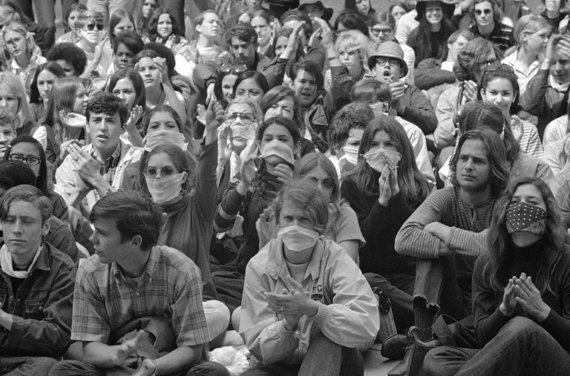
(The Oasis of Ein Gedi in the Judean Desert near Masada and the Dead Sea)
In the Torah this week, another pair of our forebears come together through a story that begins at a well. (Genesis 29)
Wells have mystical significance in our tradition.
It is easy to understand how, in the landscape of our ancestors, wells and springs were natural symbols of divine providence. For anyone who has ever visited an oasis - like Ein Gedi, its cascading rivulets and freshwater pools, its acacias and its jujube plants, its ibexes, hyrax badgers, and leopards a shocking spot of life so close to parched Masada and the Dead Sea - a sense of what words like 'miracle' and 'blessing' meant to our forebears, and a sense of how they felt the hand of the Divine in their own lives, deepens.
Convenient as our surroundings are today, and less beset (at least here in the West) by the elementary peril of thirst, we lose something in this world of taps and faucets. Water becomes something more like gasoline - fuel from a mechanized pump dispensed into containers on demand. We don't have to search for it (not far, anyhow). We tend far less to dance around it.
It becomes harder to experience immediately for ourselves how the well, for our ancestors can have been - as the Zohar, the central text of high medieval Jewish mysticism sees it - the very actuality of imminent divinity nourishing the sacred apple-orchard of this world (e.g. Zohar Vayetze, I: 151b-152a).
In the message to Congress accompanying his Reorganization Plan No. 3 of July 1970, the Executive Order that established the Environmental Protection Agency, President Richard Nixon wrote:
"As concern with the condition of our physical environment has intensified, it has become increasingly clear that we need to know more about the total environment - land, water and air. It also has become increasingly clear that only by reorganizing our Federal efforts can we develop that knowledge, and effectively ensure the protection, development and enhancement of the total environment itself."
Good government - that is to say - includes well-informed, strong stewardship and protection of the natural resources that sustain the people. This is, in a very real sense, a mitzvah, the human understanding and enactment of a sacred duty.
What exactly is the duty?
As our Torah says, in imperative terms: "For your own selves' sake, be very watchful" (Deuteronomy 4:15) - words our rabbinic tradition has, since ancient times, lifted out of the context of Sinai and revelation to take as a divine admonition about safeguarding human health and wellbeing and avoiding preventable perils. We see the principle invoked in Jewish orthodoxy in our own times to urge - as imperatives of Torah law - vaccination, seatbelts, cessation of smoking.
As the President put it back in 1970: "The Congress, the Administration and the public all share a profound commitment to the rescue of our natural environment, and the preservation of the Earth as a place both habitable by and hospitable to man."
Note that the term, as far back as 1970, was "rescue."
Healthy wellsprings make for healthy community - as the Zoahr envisions it, "all the throngs and the holy companies, all of whom drink and refresh themselves from the well," by which, in its own distinctive and holy imaginings, the Zohar means the earthly people here below, refreshed by the outpouring of divine beneficence so as to be able to celebrate in league with the host of heaven, the whole world manifesting and proclaiming divine abundance, blessing, love.
Even in ancient times, such blessing was understood as something for which we had to take responsibility.

(students protesting air pollution in California in 1970)
May we be wise enough - and very vigilant enough - that, in our own times too, the following verse, which we read after our Torah portion this week, may be fulfilled:
"I will be to Israel like dew, he shall blossom like the lily, he shall strike root like a Lebanon tree. His boughs shall spread out far, his beauty shall be like the olive tree's, his fragrance like that of Lebanon." (Hosea 14:4-5)
Our 2024 Coverage Needs You
It's Another Trump-Biden Showdown — And We Need Your Help
The Future Of Democracy Is At Stake
Our 2024 Coverage Needs You
Your Loyalty Means The World To Us
As Americans head to the polls in 2024, the very future of our country is at stake. At HuffPost, we believe that a free press is critical to creating well-informed voters. That's why our journalism is free for everyone, even though other newsrooms retreat behind expensive paywalls.
Our journalists will continue to cover the twists and turns during this historic presidential election. With your help, we'll bring you hard-hitting investigations, well-researched analysis and timely takes you can't find elsewhere. Reporting in this current political climate is a responsibility we do not take lightly, and we thank you for your support.
Contribute as little as $2 to keep our news free for all.
Can't afford to donate? Support HuffPost by creating a free account and log in while you read.
The 2024 election is heating up, and women's rights, health care, voting rights, and the very future of democracy are all at stake. Donald Trump will face Joe Biden in the most consequential vote of our time. And HuffPost will be there, covering every twist and turn. America's future hangs in the balance. Would you consider contributing to support our journalism and keep it free for all during this critical season?
HuffPost believes news should be accessible to everyone, regardless of their ability to pay for it. We rely on readers like you to help fund our work. Any contribution you can make — even as little as $2 — goes directly toward supporting the impactful journalism that we will continue to produce this year. Thank you for being part of our story.
Can't afford to donate? Support HuffPost by creating a free account and log in while you read.
It's official: Donald Trump will face Joe Biden this fall in the presidential election. As we face the most consequential presidential election of our time, HuffPost is committed to bringing you up-to-date, accurate news about the 2024 race. While other outlets have retreated behind paywalls, you can trust our news will stay free.
But we can't do it without your help. Reader funding is one of the key ways we support our newsroom. Would you consider making a donation to help fund our news during this critical time? Your contributions are vital to supporting a free press.
Contribute as little as $2 to keep our journalism free and accessible to all.
Can't afford to donate? Support HuffPost by creating a free account and log in while you read.
As Americans head to the polls in 2024, the very future of our country is at stake. At HuffPost, we believe that a free press is critical to creating well-informed voters. That's why our journalism is free for everyone, even though other newsrooms retreat behind expensive paywalls.
Our journalists will continue to cover the twists and turns during this historic presidential election. With your help, we'll bring you hard-hitting investigations, well-researched analysis and timely takes you can't find elsewhere. Reporting in this current political climate is a responsibility we do not take lightly, and we thank you for your support.
Contribute as little as $2 to keep our news free for all.
Can't afford to donate? Support HuffPost by creating a free account and log in while you read.
Dear HuffPost Reader
Thank you for your past contribution to HuffPost. We are sincerely grateful for readers like you who help us ensure that we can keep our journalism free for everyone.
The stakes are high this year, and our 2024 coverage could use continued support. Would you consider becoming a regular HuffPost contributor?
Dear HuffPost Reader
Thank you for your past contribution to HuffPost. We are sincerely grateful for readers like you who help us ensure that we can keep our journalism free for everyone.
The stakes are high this year, and our 2024 coverage could use continued support. If circumstances have changed since you last contributed, we hope you'll consider contributing to HuffPost once more.
Already contributed? Log in to hide these messages.


